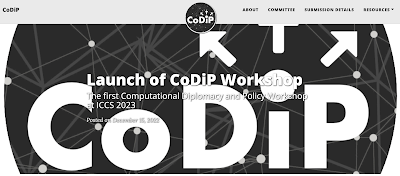Corey Schimpf and I presented our work as part of the Computational Diplomacy and Policy Workshop July 3rd, Prague, 2023, for the International Conference on Computational Science. The workshop was run by Michael Lees, Bastien Chopard, and me.
TITLE
The complexities of policy, data and computational methods: Charting a new, case-based, social science grounded, AM-Smart methods approach
Co-authors, in addition to Corey and me, include Peter Barbrook-Johnson, Lasse Gerrits, and Christopher Caden
ABSTRACT
In the globalized worlds in which we live, governments cannot escape the uncertainty, interdependence, and complexity of current public policy. Nor can they escape the urgent need for sweeping policy reform – infrastructural, political, environmental, social – to address this complexity, including the coordinating local, national, and international policies and stakeholders. Governments are also confronted presently with a big-data flood of information and the promised ‘sales pitch’ of computational science – from modelling and simulation to data science and artificial intelligence – to correctly guide decision-making. While such complexities of policy, data and methods is not an entirely new problem, what is of critical importance is how rather ineffective it has all been. The promise of complexity and computation has struggled to live up to expectation. A shift has emerged in the policy landscape, albeit minor, involving a ‘social science turn’ in complexity and computational modelling. This ‘turn’ involves using the theories, concepts, methods and empirical insights of social science to inform the complexity and computational sciences. In terms of specifics, leading areas of research includes co-production for simulation; participatory design; rigorous stakeholder engagement; a resurgence in systems mapping; mixed-methods development, such as qualitative comparative analysis and agent-based modelling; addressing issues of power and inequalities in the policy landscape, including grounding policy in a complexities of place approach; adopting a case-based perspective; and co-designing more easily accessible computational modelling platforms, called AM-Smart methods.
Our presentation will seek to outline this ‘social science’ turn in complexity and computational modelling and its implications for improving public policy. This outline will include (1) a brief overview of the above advances; (2) a quick introduction to a methods platform we developed, COMPLEX-IT, which has incorporated many of the social science turn advances into its design; and (3) critically reflect on the strengths and weakness of the social science turn, including barriers to and levers for advancing the utility of this approach across team members with distinct roles, perspectives, and intersections with public policy work. All with the goal of helping to advance the field of computational policy/diplomacy.
CLICK HERE TO ACCESS COMPLEX-IT
CLICK HERE TO ACCESS CECAN
CLICK HERE TO ACCESS PRSM – PARTICIPATORY SYSTEMS MAPPER
CLICK HERE FOR OPEN ACCESS BOOK, SYSTEMS MAPPING
CLICK HERE FOR POLDER CENTER AT UNIVERSITY OF AMSTERDAM
CLICK HERE FOR DURHAM RESEARCH METHODS CENTRE
CLICK HERE for the PDF of our Workshop Introduction
HERE ARE THE OTHER PRESENTATIONS FROM OUR TWO-PART SESSION
 |
